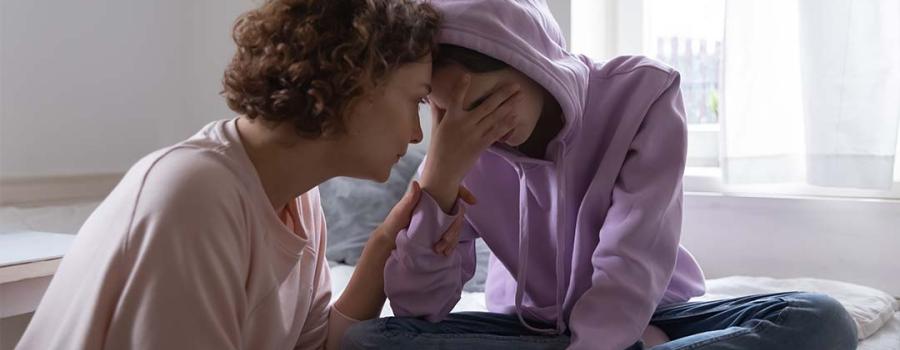As a parent or caregiver, you anticipate and meet your child’s physical needs, such as hunger or tiredness, and are attuned to their mental and emotional needs. You can guess when your child feels sad, angry, anxious, or depressed. You can help identify why they are feeling this way. But how do you know when your child’s feelings won’t pass, and what meaningful actions can you take to help?
Noticing the Signs
As early as age 8, children can begin to experience depression and anxiety. While lots of people are familiar with signs of these disorders in adults (withdrawal, loss of interest, etc.), it can be harder to spot in kids, especially when they are young. Common symptoms to watch for in children are lethargy, reduced appetite, stomach pain, or difficulty concentrating. Be mindful of your children’s behaviors, such as sleeping and eating habits.
Anxiety and/or depression in children and teens can be triggered by different fear-based external or internal disorders. Signs of an internal disorder can be when a child refuses to be in a public or social situation, demanding to stay home rather than experience what would be a healthy social interaction, and experiences fear and anxiety over having attention drawn to them. Signs of an external disorder, or oppositional defiant disorder can be when a child takes actions that are disruptive around others, like being defiant to caregivers, difficulty sitting quietly, and constantly fighting for control.
When you notice these signs, your first instinct is to try and help your child, or even “fix” their depression and/or anxiety for them as no caregiver wants to see their child in pain. However, while painful to realize, no one can fix or own someone else’s mental health. So how can you help as the caregiver?
How Can You Help Your Child?
While difficult, especially if your child or teen literally can’t explain what’s wrong or simply refuses to talk, you must talk to your child. Avoid statements like “You don’t need to be depressed,” or “What do you have to be sad or worried about?” Seek to understand them, listen, and make them feel heard.
There is a school of psychotherapy called “behavioral activation” which boils down to taking action to feel better – the “do then feel” method. A common paradox with depression is that the person feels like they can’t do anything, even activities they normally enjoy. But by doing those activities, it often helps a person’s mood and outlook.
With this information in mind, an action you can take is to walk alongside your child and help them “do then feel” by taking part in activities with them. Reach out to your community, people who know your child such as peers, teachers, mentors, etc. to also engage your child in conversations and activities that you know they enjoy. Make sure to model healthy behaviors, like maintaining relationships, doing your normal activities, or even seeking out therapy and support for yourself.
If you feel that the negative behaviors are worsening or your child is making statements like “I really wish I wasn’t here,” you must seek professional help immediately and set a bottom line with your child. You can say something like, “If this [fill in the blank] behavior or thought starts happening, this is the action we are going to take… We will need to bring you here, get you this support, and do what needs to be done to help you feel safe.”
Information is important. Share your concerns with your child’s doctor. They can partner with a mental health provider to recommend a treatment that can target some of these concerns. Always reach out to your network for help and support, not only for you child, but for yourself as well.
Nexus Family Healing is a national nonprofit mental health organization that restores hope for thousands of children, families, and adults each year through services in community mental health, crisis and stabilization, foster care and adoption, and residential treatment. For over 50 years, we’ve used innovative, personalized approaches to heal trauma, break cycles of harm, and reshape futures. We believe every child is worth it — and every family matters. Access more resources at nexusfamilyhealing.org/resources.
